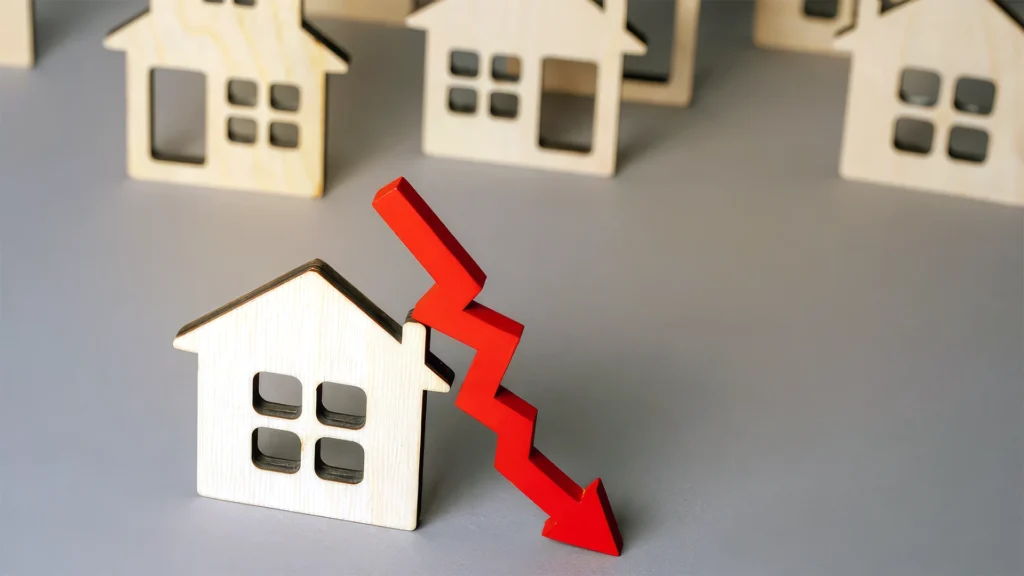Are you considering selling your house, but you’re not sure if it’s the right time? Many homeowners face this understandably tricky decision. There are many factors at play. Markets fluctuate, costs rise and fall, new government schemes are launched, and local demand can also have an impact.
You may be wondering, is it a good time to sell a house? If that’s the case, you’re in the right place. This article will take a deep dive into the best times to sell a house in the UK (including the best and worst months to sell a house). We’ll also explore important considerations you may need to make based on your needs and your individual situation, because everyone’s circumstances are unique.
When is the best time to sell a house ?
Seasonality and the real estate market
Generally, spring and early summer are the best seasons to sell a house for several reasons.
- The weather improves (finally!), and plants start to grow. Let’s be honest, homes and gardens look better and are more enticing in warmer weather (picture a pretty spring garden or a house bathed in bright morning sunlight). Also, the ability to open doors and windows to air the property out helps it seem fresh and clean. Winter can make the space feel smaller as very few windows and doors are open.
- Families with children will often want to start looking in spring so they can be in the property before the next school year. They may also want to move into a catchment area to secure a place in a local school. You can’t underestimate wanting to find the perfect house in the catchment for a desirable school!
- On a practical level, the better weather in the summer makes the process of moving house much easier. After all, who wants to be lugging boxes back and forth in the middle of a bitter UK winter? Plenty of school holidays also make it more convenient for buyers to view prospective properties.
- The increase in demand and more buyers can drive prices up and put you in a strong position. However, this also means that buyers have plenty of opportunities to find an alternative property.
The late summer and early autumn months also often see a second peak in interest as people are back from their holidays, the kids are back at school, and many people suddenly decide they’d like to move before Christmas. Those in a rush to get in their home before the mayhem of Christmas are often willing to accept a less desirable deal.
January may also see another rise in interest as people are ready to look for a new property after Christmas, especially projects or rental homes. However, local market conditions can affect this, and the shorter days with bad weather don’t always showcase properties to their fullest.
What is the best month to sell a house in the UK?
The best month of year to sell a house (or put your house on the market) is March to May. Why? Strong demand and favourable selling conditions offering plenty of advantages. After the winter comes to an end, people feel in a better position to sell.
March is potentially the best month to put your house on the market. Buyers are often in a better financial position at this time of year without the pressure of purchasing Christmas presents and spending on summer holidays. Families tend to start looking from around March in an attempt to move before the next school year starts.
Secondly, September and October can also prove fruitful. The autumnal weather makes for pretty viewings (think of all the pretty autumn colours in gardens).
What is the worst month to see a house in the UK?
July and August, as well as late November and December, are considered the worst months to sell a house in the UK. This is because in July and August, a lot of people are away on their summer holiday. Christmas seems to send everybody into a spin and the weather in the midst of winter makes viewings a challenge. Plus, people don’t want to spend long outdoors in the cold viewing outdoor spaces.
What is the best day of the week to list your home?
Monday is considered the best time to list a property for sale as people are often busy on weekends. In fact, Which? conducted a survey in 2017 that found houses listed on a Monday took an average of 176 days to sell. The worst day to list a property is Sunday, taking an average of 213 days to sell.
In 2014, Rightmove found that Tuesday evenings are the peak time for people searching for properties. Knowing the little details like this can make all the difference!
Selling in a Recession or Buyer’s Market
Is it a good time to sell a house in a recession? Well, the answer is… it depends. Recessions are traditionally seen as buyer’s markets, with lower house prices and less demand treating them favourably.
However, as many people choose to sit tight during a recession, there are usually fewer properties on the market, potentially putting the seller in a good negotiating position. Traditionally, desirable properties are less affected by recessions, and you may have less competition from other sellers. Local market conditions, the type and price range of your property, and your urgency to sell will all affect whether a recession is a good or bad time to sell a house.
Preparing your home for sale
Regardless of the time of year, there are lots of things you can do to increase the value and desirability of your property. This includes documentation, redecorating, fixing the garden or removing clutter, and large projects such as upgrading the boiler, fitting a new kitchen or bathroom, or even replacing the windows. For more information, refer to our guide about how to add value to your home.
Documents you need to sell your home
Having your documents together and in order is vital to selling your home quickly and without hiccups. You can see our Full List of Documents here, but they include things like:
- Proof of ID
- Title Deeds
- Energy and Safety Certificates
- Mortgage Details
- Receipts
Do you want to sell your home quickly?
Sometimes, people need a quick sale for a whole host of reasons. Many home owners consider selling home privately to avoid agent fees and to have more control on the process – learn more about how to sell privately here.
We will buy your home quickly, in any condition, with cash, and in as little as 7 days at any time of the year. We understand that selling your house can be stressful, and we’re here to make the process as hassle-free as possible.
To find out more, learn how we work, call us for free on 0843 221 1111 or fill out the form to Get a Free Cash Offer.
Economic and Personal Factors
Selling a home isn’t just about checking the market; it’s deeply personal. Maybe you’re relocating for a dream job, downsizing after the kids have moved out, or facing financial pressures that make holding onto the house impossible. Whatever the reason, the decision to sell is often tied to emotions as much as economics.
Your Personal Financial Situation: Can You Afford to Sell Right Now?
Imagine you’re sitting at your kitchen table, running the numbers. Mortgage payments, moving costs, estate agent fees—it all adds up. Selling a house isn’t just about listing it and waiting for offers; it’s about knowing whether you’re financially ready to make the move.
Here are some key questions to ask yourself:
- Do you have enough equity? If you sell now, will you walk away with a profit, or will you owe more than the house is worth?
- Are you financially prepared for the costs of selling? From home valuation fees to conveyancing costs, selling isn’t free.
- What’s your next move? Buying a new home? Renting? If you’re buying, will mortgage rates work in your favor, or are you looking at higher costs than expected?
Many sellers face what’s known as seller’s remorse—that nagging feeling of doubt after selling. It often happens when people rush into a sale without considering the long-term financial impact. If you’re unsure whether now is the best time to sell, talking to a local property expert or checking recent sales history in your area can help you make an informed decision.
Planning a move? Download our free UK moving home checklist to stay organised from start to finish.
The Economy and the Housing Market: How Does It Affect Your Sale?
We’ve all seen headlines like: Housing market crashes, Mortgage rates skyrocket, Cost of living crisis deepens, etc. But what do these economic factors mean for you as a seller?
- Supply and Demand Dictates Prices
Think about the property market like a Beyoncé concert. If there are limited tickets (low housing supply) but thousands of fans desperate to go (high demand), ticket prices soar. The same happens in real estate—when there are more buyers than homes, prices rise, and homes sell quickly. But when there are more houses on the market than interested buyers, sellers may have to lower their asking price to attract offers.
Right now, data from the NAEA monthly housing report shows that sales volume fluctuates based on supply and demand shifts. Understanding these trends can help you time your sale to maximise profit.
- Mortgage Rates and Buyer Confidence
Mortgage rates can make or break a housing market. When rates are low, more people can afford to buy, boosting housing demand. But when rates rise, buyers hesitate, leading to longer selling times and reduced offers. If you’re selling in a period of high mortgage rates, be prepared for fewer offers or buyers negotiating aggressively.
- Cost of Living and Buyer Behavior
The cost of living crisis means people are watching their spending more than ever. If energy bills, food prices, and general living costs are rising, fewer buyers may feel financially secure enough to take on a mortgage. This could mean selling takes longer or you need to price your home competitively.
Key takeaway:
If you’re thinking, “Is it a good time to sell a house?”—the answer depends on both your personal situation and the economic landscape. Keeping an eye on market rates, checking local property expert opinions, and staying informed about housing market data can give you a clearer picture of whether now is the right time to sell.
Impact of Supply and Demand: How It Affects Your Home Sale
If you’ve ever tried to buy concert tickets, book a last-minute holiday, or even get your hands on a limited-edition sneaker, you know how supply and demand works. The same principle applies to selling a home—when demand is high and supply is low, you can command a higher price. But when there are more homes on the market than interested buyers, you may struggle to sell quickly or get your ideal price.
The ‘Golden Window of Opportunity’ for Sellers
In real estate, there’s something known as the “golden window of opportunity”—a period when sellers have the best chance of securing a high price and a quick sale. This usually happens when buyer demand is high but there aren’t too many competing properties on the market.
For example, if inventory is low in your area and you list at the right time, you could have multiple offers within days. However, if there’s an inventory increase (meaning more homes become available), your home will be competing with several others, which may force you to lower your asking price.
Competitive Markets and Chain-Free Buyers
In a competitive market, where buyers are bidding against each other, properties sell fast, often above asking price. This is great news if you’re a seller, but it’s important to act fast before conditions shift. On the other hand, in a slow market, you may need to adjust your strategy, such as offering incentives or staging your home to stand out.
If you want a fast sale, targeting chain-free buyers (who aren’t waiting to sell their own home first) can speed up the process. First-time buyers, investment buyers, or those downsizing with cash in hand can make your sale smoother.
Economic Factors That Impact Supply & Demand
– Recession fears: When people worry about an economic downturn, they may delay buying a home, which slows demand.
– Mortgage products: The availability of competitive mortgage rates can bring more buyers into the market, increasing demand.
– Cost of living crisis: When daily expenses rise, people may hold off on buying, affecting overall housing demand.
If you want to maximise your sale, keeping an eye on housing market data and understanding sales volume trends can help you decide when to list.
Market Timing Strategies: When Should You Sell?
Timing can be everything when selling a home. Listing your property at the right time of year can mean the difference between a quick, profitable sale and months of waiting with little interest.
Peak Season: Spring and Early Summer
Spring and early summer (March to June) are widely considered the best time of year to sell a house in the UK. The days are longer, gardens are in full bloom, and homes look their best in natural light. Buyers—especially families—are eager to move before the school year starts, making them more motivated to put in offers.
Additionally, with more homes selling during this period, estate agents and solicitors tend to process sales faster, reducing delays.
But the competitive nature of auctions and multiple listings means buyers have choices. If your home doesn’t stand out, they may move on to another. This is why home staging and pricing your property right are crucial during peak season.
The Risks of Listing Too Late
If you wait until the peak season is ending (late June or July), you might face a slowdown. People start going on summer holidays, meaning fewer viewings and slower sales. Similarly, listing too late in the autumn can mean missing out on serious buyers before the festive buyer surge slows things down in December.
Selling in the Off-Season: Autumn and Winter
Autumn (September to November) offers another good selling window, especially for buyers looking to move before Christmas. The crisp air, golden leaves, and cozy vibes can make homes feel extra inviting.
Winter, however, is often the worst month to sell a house in the UK—especially in December. With Christmas expenses and colder weather discouraging house viewings, buyers tend to put plans on hold until the new year. That said, serious buyers still exist in winter, and off-season sellers can attract motivated buyers looking for a quick move.
Local Market Insights and Targeting the Right Buyers
Every area is different, so local market insights matter. Some areas see year-round demand due to job opportunities, university students, or strong rental markets. If your home appeals to specific buyers—like downsizers or young professionals—your strategy should reflect their needs.
For instance, if you’re selling a small city apartment, your target market might be young professionals, who buy based on convenience rather than seasonality. On the other hand, if you’re selling a family home, spring will likely be your best bet.
If you’re unsure, consulting with a local property expert or researching housing market data can give you the insights needed to time your sale perfectly.
Conclusion
If you’re looking for a quick, hassle-free sale at any time of the year, Zapperty can help. We buy homes in any condition, with no hidden fees, so you can move forward with confidence.
Reach out to us and see how we can make selling your home simple and stress-free.





